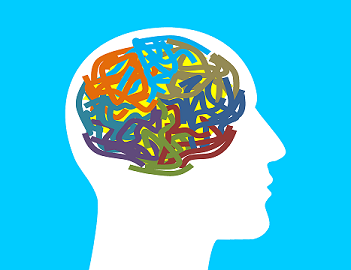Top 5 Strategies to Cultivating Your Mental Health
Top 5 Strategies to Cultivating Your Mental Health

Modern life keeps us very busy.
We find ourselves ignoring the fundamentals like our health, family, friends, community etc.
All that neglect causes dysfunction in our lives.
We try desperately to fix the problem after it becomes a significant issue. In other words, we are attempting to reverse the damage once it has already become a disorder.
As a physician, this neglect is something I see among my patients every day.
It is important to remember that prevention is a big piece to eradicating depression and anxiety.
Yes, there are some things that are simply unavoidable such as genetics and certain life stressors, such as a death of a loved one or a lay-off from a job.
However, if we focus on areas of our lives we can control, then we would have a much easier time coping with events that are out of our control; the “curveballs” of life.
Though the word “habit” can have a negative connotation, it more accurately describes a behavior done repetitively as a routine. A habit can be a choice, and a healthy habit is a healthy choice. These lifestyle amendments are time-tested and clinically proven to be effective in preventing the symptoms associated with anxiety and depression.
Here are 5 simple strategies we can incorporate into our day-to-day routine to lay a healthy foundation and maintain our mental wellbeing.
1. Protect Your Sleep, Your Life Depends on It!
This is perhaps the most important intervention to our mental upkeep.
According to this study and this book, chronic sleep problems affect 50% to 80% of patients in a typical psychiatric practice, compared with 10% to 18% of adults in the general U.S. population.

It is a chicken or the egg dilemma.
Do mental health disorders cause sleep disturbances or does insomnia trigger a cascade of symptoms leading to a mental health problem? The basic answer is both can occur.
Neuroimaging and neurochemistry studies suggest that a good night's sleep helps foster both mental and emotional resilience, while chronic sleep disruptions set the stage for negative thinking and emotional vulnerability.
In 2010, the American Medical Association along with the American Academy of Sleep Medicine recognized insufficient sleep as a serious health risk amongst adolescents.
It is not too surprising that sleep issues in our teen years can persist into adulthood.
The brain likes patterns; repetition, routine. If it receives signals on a regular basis, even unhealthy ones, it will lock into that pattern.
Good sleep hygiene is of the utmost importance in preventing sleep disorders which can lead to other comorbid psychiatric illnesses.
Good sleep hygiene entails behaviors such as:
- Keep a regular sleep schedule. Go to bed around the same time each night.
- Do not eat a heavy late meal.
- Watch tv in a room other than your bedroom.
- Turn the T.V. off 30 minutes before bedtime.
- Put down the electronics 30 minutes before bedtime. The screen, even on dim mode, can still be stimulating to the brain via the eyes.
 2. Maintain a Balanced Diet
2. Maintain a Balanced Diet
Our eating habits can play a large role in our mood regulation throughout the day.
Big carb loads can lead to big carb crashes which can cause fatigue, concentration issues and irritability, symptoms that are also apparent in depression.
Protein, healthy non-saturated fats, fiber and some simple carbohydrates should all be represented in our meals.
Moderating our food intake will give us the best chance of having a good day.
3. Get Regular Exercise
 Any activity that induces our heart rate to increase is considered exercise.
Any activity that induces our heart rate to increase is considered exercise.
For substantial health benefits, adults should do at least 150 minutes a week of moderate-intensity exercise, which equates to about 20 minutes a day.
Yes, we all have very busy lives, but we can all find a way to carve out 20 minutes for ourselves for this very important task.
In fact, healthy diet and exercise will circle back up to improving our sleep.
If we engage in habits #1-3, our bodies will certainly thank us.
4. Get Involved in Your Community
 Whether it is through a community center or a church or temple, surrounding ourselves with people who have similar goals as us can have a profoundly positive impact on our mental wellbeing.
Whether it is through a community center or a church or temple, surrounding ourselves with people who have similar goals as us can have a profoundly positive impact on our mental wellbeing.
The Patient-Centered Outcomes Research Institute has helped fund studies investigating this very topic. Donating our time towards a community project, or simply socializing is a quality way to help our self-esteem and build a network of support.
Interacting with fellow human beings reminds us we are not alone and gives us an outlet to share our thoughts and feelings.
Community can be the forum in which topics such as depression and anxiety can be discussed freely.
5. Find a Hobby
 Lack of motivation and anhedonia defined as decreased pleasure in pleasurable activities are classic hallmark symptoms of depression.
Lack of motivation and anhedonia defined as decreased pleasure in pleasurable activities are classic hallmark symptoms of depression.
Finding an enjoyable activity serves a preventative role in combating the onset of depression and anxiety, as it can be a healthy outlet at the end of a stressful and can be a positive distractor from any negative thoughts.
Engaging in an activity that brings us pleasure and enjoyment has a physiologic effect on our brains, triggering a release of neurotransmitters such as dopamine, serotonin and newly discovered brain-derived neurotrophic factor, which is our ammunition in fighting depression and anxiety.
Hobbies such as crafting, boxing, book clubs, gardening and many others will also circle back up to emphasizing the importance of socializing and being around others, as isolation can be a trigger for depression and reinforce anxiety.
Remember, activity “activates” us all.
The Next Step
Which of these items are easiest for you to implement?
Take out your phone and enter them into your calendar as nudges to getting started.
Including these fundamental activities in your day-to-day will change your life for the better. Your positivity will also begin to affect everyone around you.
By following these 5 lifestyle choices, we put ourselves in the best position possible to prevent the onset of depression and anxiety. Though typically we are trying to “kick” habits, these are 5 healthy habits we should all try to “kick” into gear for a better way of living.












